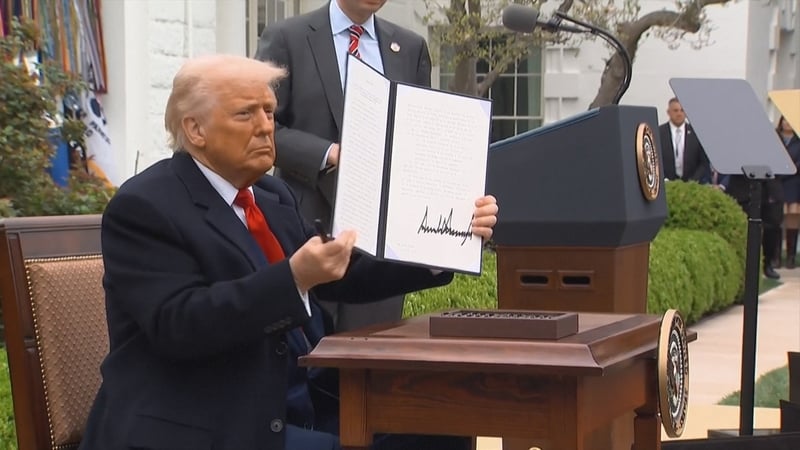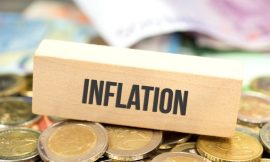US President Donald Trump’s tariffs could result in a a hit to demand for Irish exports from the US, AIB’s chief economist David McNamara has warned.
The economist said that while the initial plans may yet be changed post trade negotiations, the impact is set to be a sharp fall in US trade and could generate higher inflation for US consumers.
He also said it remains unclear how the increased costs will distribute between US consumers and Irish-based producers, depending on the elasticity of demand and currency movements.
“Given the ‘necessity’ status of pharma products – our main export to the US, a more limited impact might be expected if tariffs are eventually levied here, particularly given the long-lead in times for firms to potentially shift production to the US – a stated goal of President Trump,” he said.
“However, the imposition of tariffs is an anchor on global trade and will likely be a drag on manufacturing output and GDP growth in Ireland, and to a lesser extent on the labour market and domestic demand,” he added.

The CEO of ISME, Neil McDonnell, said that while only 5% of his members export to the US, those exports would make up about 37% of their trade, leaving them “significantly impacted”.
He said for many SMEs in Ireland, their largest or sole customer would be a US multinational.
“What are those businesses going to do? What volume of business are they going to do with Irish SMEs and suppliers in the future? It’s the longer term affects of alteration to trade that’s worrying a lot of SMEs at the moment,” he said.
“Uncertainty has an immediate effect, irrespective of what the Government and the EU’s response is going to be. Uncertainty in the market creates effects right now, irrespective of what the outcome is going to be in the longer term,” he added.
Martin Shanahan, Head of Industry at Grant Thornton, said the announcement by President Trump of 20% reciprocal tariffs on the EU will unquestionably have a negative impact for Ireland, given its significant trade with the US.
Once implemented, Mr Shanahan said the tariffs will have an immediate impact in two potential ways – higher consumer prices and lower company profits and most likely a combination of both.
“In turn, lower company profits will impact corporation tax take over time,” he said.
“Medium to longer term impacts will depend on the decisions that companies make around their supply chains, global production, tax, and future investments,” he added.
He also said the tariffs will have different potential impacts across different industries depending on their exposure to trade.
“It is of course still possible that a negotiated outcome will see tariffs averted,” he added.

The CEO of business group Ibec, Danny McCoy, said the estimated total impact of the US tariffs for Ireland will be “about 2-3% of an impact on our exports”.
“You’ve got to take it in perspective in the aggregate, it’s not that big a deal in the short-term,” he told RTÉ’s Morning Ireland.
“For individual companies of course this could be a fair bit of crisis now this morning – there will be job impacts from this,” he stated.
Mr McCoy said the “big impact” will come from world trade, which will affect Ireland.
“So the specifics aren’t as bad as they could have been. It’s a really stupid thing to have done, but nonetheless,” he said.
Mr McCoy said it is “tit for tat” in situations like this and there must be equal retaliatory measures.
“Even though that punishes us as well,” he said.
He urged the EU to take a bit of time, adding that it does not to retaliate immediately.
“Let’s try and get negotiations going. But if they fail, we have to fight fire with fire,” he added.
Mr McCoy said Mr Trump’s reasoning for imposing tariffs was a “crass way” of doing what he wanted to do, “which was to put tariffs on every country in the world”.
Dr Loretta O’Sullivan, Partner and EY Ireland Chief Economist, said that tariffs are a double-edged sword – they harm the country that imposes them as well as the countries they are imposed on.
“Ireland’s significant export linkages with the US mean our economy is particularly exposed to transatlantic trade barriers, though pharmaceuticals have been excluded from the President’s ‘Liberation Day’ announcement,” she said.
“This is welcome but may only be a temporary reprieve. And with the EU among others preparing countermeasures in the event that negotiations are not successful, the risk of a global trade war remains very real,” she stated.
“While the Irish economy is facing all this from a position of strength, domestic policies to shore up competitiveness such as infrastructure investment will be very important in the period ahead, along with helping companies to diversify into new markets,” she added.
Simon MacAllister, Partner and Co-Head of Geopolitical Strategy at EY Ireland, said the US tariff announcements are a significant remaking of the global trading environment.
He said the basis of calculation of the tariffs, the (limited) exemptions, and how the rates are to be applied will all require detailed assessment.
“Taken with the potential for how different trading partners will react, it presages a period of significant uncertainty for exporters. The impact on a sector-by-sector basis will need to be understood, with mitigation strategies developed,” Mr MacAllister said.
“The overall level of tariff rates on key trading partners such as the EU, China, UK, Taiwan, Japan and Korea will significantly disrupt trade flows, with knock on impacts for US consumer prices,” he added.

Stephen Holst, Managing Partner at McCann FitzGerald LLP Ireland, said that these tariffs are wide-ranging in their approach in the short-time and they undermine the strong transatlantic partnerships its clients’ businesses rely on and which have been built over many years.
“Ireland’s legal sector will help clients navigate the fallout and to mitigate damage to the Irish economy, but in its current form, this is a lose-lose for all. The details of any exclusions and any retaliatory tariffs will be crucial to monitor in the coming days and weeks,” he added.
Neil Hughes, CEO at Azets Ireland, said the country’s thriving indigenous business sector will not emerge unscathed from the sweeping tariffs levied by the US.
“Mid-sized firms in the food and drink sector trading internationally, and the many entrepreneurial firms servicing the pharmaceutical sector will come under increased pressure as costs escalate and disruption to supply chains take root,” he stated.
“Managing the impact of the 20% tariffs on business is crucial. However, we cannot afford to risk ignoring the real and pressing issues facing indigenous businesses who are at the heart of the real economy. Prioritising reforms and policy measures which support ambitious indigenous businesses can foster a more resilient and sustainable economy which can better withstand international volatility,” he added.
The Irish Farmers’ Association said the relative differences of the tariffs announced last night will impact the competitiveness of Irish products on the US market, including Kerrygold.
“The fact that New Zealand only has a 10% tariff for dairy products and the UK only has a 10% tariff on drinks, while the EU will have 20% tariffs, will leave us at a competitive disadvantage against some of our biggest competitors in these two sectors,” the IFA said.

Brendan Murphy, Partner at Baker Tilly Ireland, said the tariffs announcement is a lose-lose situation, with US consumers set to pay the highest price.
“In Ireland, the food and drink industry are feeling the immediate heat, but with reports of stockpiling in the US, some companies may have mitigated the worst of the impact. The delay on pharma tariffs seems strategic, likely tied to US drug pricing and upcoming Medicare reforms,” Mr Murphy said.
He noted that the interaction with the Windsor Framework is concerning, with Irish goods facing 20% tariffs while the UK sees only 10%.
“This could create short-term advantages for Northern Ireland’s exports, but the real concern lies in how retaliation plays out. The UK’s approach and how it relates to that of the EU will be critical,” he said.
“While Trump didn’t call out Ireland directly, his emphasis on foreign investment in the US -highlighting Irish-based giants like Apple, Eli Lilly and J&J – signals that Ireland, and particularly its multinational presence, remains firmly on his radar,” he added.
Audit, tax and consulting firm RSM Ireland said yesterday’s tariffs are likely just the start of a prolonged period of economic uncertainty around trade and tariff policy.
“The recently announced tariffs will be subject to change as negotiations take place and the impact on Ireland, the UK and Europe, as a whole, will partly depend on the response from those governments,” James Burrows, Corporate Tax partner at RSM Ireland, said.
“Cool heads in the immediate near term will be critical in ensuring the many nuances and outcomes of the ensuing bilateral negotiations are factored into any medium to long-term investment decisions,” he added.




